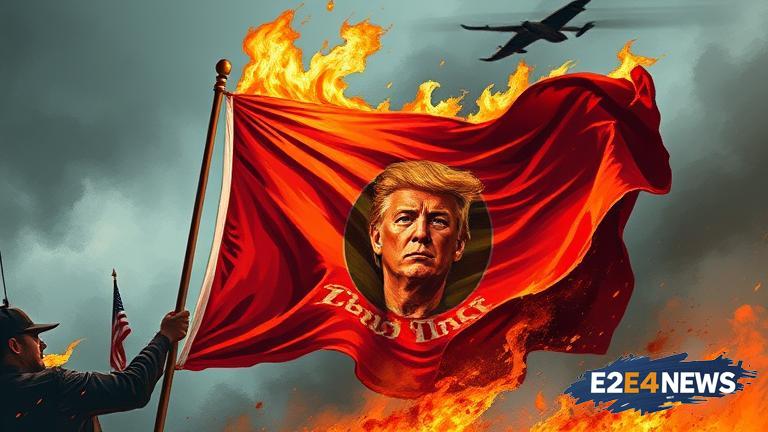President Trump’s recent proposal to issue an executive order on flag burning has sparked a nationwide controversy, with many Americans weighing in on the issue. The proposed order would make it a federal crime to burn the American flag, with potential penalties including imprisonment and fines. While some argue that the flag is a sacred symbol of American patriotism and deserves to be protected, others claim that the order is an attack on free speech and the First Amendment. The issue has been a longstanding debate in the United States, with the Supreme Court previously ruling that flag burning is a form of protected speech. In the 1989 case of Texas v. Johnson, the court held that burning the flag is a form of expression and therefore protected under the Constitution. Despite this, many politicians and lawmakers have continued to push for legislation that would ban flag burning, citing the need to protect the symbol of American patriotism. However, civil liberties groups and free speech advocates argue that such laws would be unconstitutional and would have a chilling effect on free speech. The proposed executive order has also raised concerns about the potential for abuse of power and the erosion of civil liberties. Many have questioned whether the order would be used to target certain groups or individuals who engage in peaceful protests or other forms of dissent. The issue has also sparked a debate about the role of the president in shaping the law and the potential for executive overreach. While some argue that the president has the authority to issue executive orders on matters of national importance, others claim that such orders should be subject to congressional review and approval. The controversy surrounding the proposed order has also highlighted the deep divisions within American society, with some arguing that the flag is a unifying symbol that deserves to be protected, while others see it as a symbol of oppression and injustice. As the debate continues to unfold, it remains to be seen whether the proposed executive order will be implemented and what impact it will have on American society. The issue is likely to be the subject of intense litigation and debate in the coming months and years. In the meantime, many Americans are left to wonder about the potential consequences of such an order and the implications it could have for free speech and civil liberties. The proposed order has also raised questions about the potential for international backlash, with some countries potentially viewing the move as an attack on free speech and democracy. As the world watches the debate unfold, it remains to be seen how the issue will be resolved and what impact it will have on America’s reputation as a beacon of freedom and democracy. The controversy surrounding the proposed order has also highlighted the need for a nuanced and informed discussion about the role of free speech in American society. While some argue that free speech is essential to a healthy democracy, others claim that it must be balanced against the need to protect national security and public order. As the debate continues, it is likely that the issue will be the subject of intense scrutiny and analysis, with many Americans seeking to understand the implications of the proposed order and the potential consequences for American society. The proposed executive order has also sparked a debate about the role of the media in shaping public opinion and the potential for bias and misinformation. While some argue that the media has a responsibility to provide accurate and unbiased information, others claim that it is often driven by a partisan agenda and a desire to shape public opinion. As the controversy surrounding the proposed order continues to unfold, it remains to be seen how the media will cover the issue and what impact it will have on public opinion. The issue has also raised questions about the potential for social media to shape public discourse and the potential for online harassment and abuse. While some argue that social media has created new opportunities for free speech and public engagement, others claim that it has also created new challenges and risks. As the debate continues, it is likely that the issue will be the subject of intense discussion and analysis, with many Americans seeking to understand the implications of the proposed order and the potential consequences for American society.
